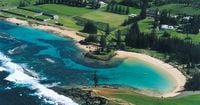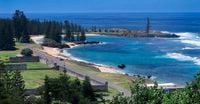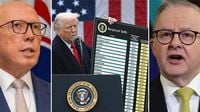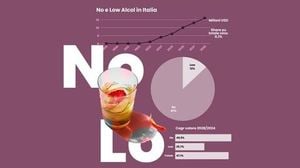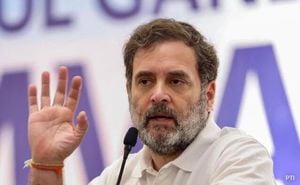In a surprising turn of events, US President Donald Trump has imposed a staggering 29 percent tariff on Norfolk Island, an Australian territory, while the rest of Australia faces a 10 percent tariff on imports. This announcement, made on April 3, 2025, has left many questioning the rationale behind such a disparity, with Prime Minister Anthony Albanese expressing his bafflement over the decision.
"I'm not quite sure that Norfolk Island, with respect to it, is a trade competitor with the giant economy of the United States," Albanese stated. He further emphasized the unusual nature of the tariff, saying, "But that just shows and exemplifies the fact that nowhere on Earth is exempt from this." Norfolk Island, located about 1,400 kilometers east of the Australian mainland, has a population of approximately 2,000 residents, raising concerns about its economic viability under such tariffs.
Alongside Norfolk Island, the White House specified that Heard Island and McDonald Islands, another Australian territory, would also face a 10 percent tariff. Both islands are uninhabited and primarily consist of barren land. Christmas Island, yet another Australian territory, will see the same 10 percent tariff as the rest of the country. The tariffs, which Trump announced would take effect at midnight in Washington, D.C., are set to impact Australian exporters significantly.
Trade Minister Don Farrell reassured that Australia would continue to sell goods to the US despite the tariffs, particularly highlighting the impact on Australian wine exports. "When China imposed a 220 percent tariff on Australian wine, that killed wine exports the next day, stone dead," he remarked. "That's not what has happened here. Australian wine will now apparently go into the United States at a 10 percent tariff. We'll still continue to sell wine into the United States." Farrell also hinted at the potential for a new free trade agreement with the European Union, suggesting that the recent tariff changes could provide leverage in negotiations.
The global implications of Trump's tariffs have sparked outrage not only in Australia but also worldwide, as nations scramble to comprehend the effects on their economies. Opposition Leader Peter Dutton criticized Albanese for being "missing in action" during this trade war, claiming that the Prime Minister should have used more leverage with the US President amid the global turmoil.
In the wake of these developments, Senator Jacqui Lambie has voiced her opinion on ABC Melbourne, suggesting that Australia should consider withdrawing from the AUKUS agreement, a trilateral security pact with the United States and the United Kingdom. Lambie described the agreement as a "waste of money" and proposed limiting military relations with the US, stating, "What should [the government] do? I tell you, they can say, ‘you’re not getting any of our critical minerals,’ because everybody’s screaming out for them."
As countries grapple with the fallout, the tariffs have also affected other nations across the Pacific. Fiji, for instance, is facing a staggering 32 percent tariff, while Vanuatu is hit with a 23 percent tariff, and Nauru faces a 30 percent tariff. The US is Fiji's primary export market, with over half a billion dollars worth of goods traded in 2024, making the new tariffs a significant concern for the Fijian economy.
In contrast, Australia has managed to fare somewhat better than other nations, including some of the world's poorest economies in the Pacific. For example, Tonga, which counts the US as its second-largest export market, and Samoa, which ranks third, will also be subject to the 10 percent tariff. However, the Solomon Islands, with a GDP of approximately $3 billion, exported only $1.75 million worth of goods to the US in 2024, rendering the impact of the tariffs less significant.
New Zealand, too, has been affected, but Foreign Minister Winston Peters described the 10 percent tariff as a success following a recent diplomatic mission to Washington, D.C. He stated, "We went to Washington DC to get the best possible result for New Zealand in the circumstances, by making strong, genuine, in-person connections with the US Administration."
As the dust settles from Trump's "Liberation Day" tariffs, countries around the globe are left to navigate the economic repercussions. The unexpected tariffs on Norfolk Island and the broader Australian territories underscore the unpredictable nature of global trade relations, leaving many to wonder what the future holds for their economies.
With trade tensions escalating, the Australian government faces a challenging landscape as it seeks to protect its interests while navigating the complexities of international relations. The ongoing dialogue regarding tariffs and trade agreements will undoubtedly shape the economic future of not only Australia but also its neighbors in the Pacific.
